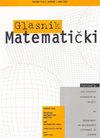满足一类三角形数组的数的极限定理
IF 0.5
4区 数学
Q3 MATHEMATICS
引用次数: 2
摘要
推广了一类三角形数组的极限定理的研究,该类数组由二元线性递推式定义,具有二元线性系数。利用半指数生成函数,得到了数值的偏微分方程和特殊解析表达式。应用所得结果证明了一类特殊数的渐近正态性,并给出了极限分布的收敛速率。我们证明了极限分布并不总是高斯分布。本文章由计算机程序翻译,如有差异,请以英文原文为准。
Limit theorems for numbers satisfying a class of triangular arrays
The paper extends the investigations of limit theorems for numbers satisfying a class of triangular arrays, defined by a bivariate linear recurrence with bivariate linear coefficients. We obtain the partial differential equation and special analytical expressions for the numbers using a semi-exponential generating function. We apply the results to prove the asymptotic normality of special classes of the numbers and specify the convergence rate to the limiting distribution. We demonstrate that the limiting distribution is not always Gaussian.
求助全文
通过发布文献求助,成功后即可免费获取论文全文。
去求助
来源期刊

Glasnik Matematicki
MATHEMATICS, APPLIED-MATHEMATICS
CiteScore
0.80
自引率
0.00%
发文量
11
审稿时长
>12 weeks
期刊介绍:
Glasnik Matematicki publishes original research papers from all fields of pure and applied mathematics. The journal is published semiannually, in June and in December.
 求助内容:
求助内容: 应助结果提醒方式:
应助结果提醒方式:


